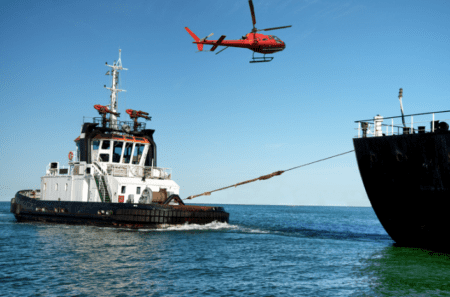Last Updated on September 2, 2025 by SEO Rankings
Injuries on vessels come with unique challenges, particularly for those working in maritime environments. If you’ve suffered an injury on a moored vessel, you may wonder if the Jones Act covers your injury and if maritime lawyers can seek the compensation you deserve.
While many workers assume they’re only covered when offshore, the Jones Act extends further than most might expect. In this article, we’ll look at the reach of the Jones Act, what “moored” really means, and how an injury on a stationary vessel still entitles you to legal protection.
The Jones Act and Its Reach for Injured Seamen
The Jones Act, part of the Merchant Marine Act of 1920, primarily aims to protect maritime workers and seamen injured on the job due to employer negligence or unsafe conditions. The Act provides a path for maritime workers to seek compensation for injuries beyond workers’ compensation, especially as injuries sustained in maritime work can be severe.
A Jones Act case involves specific legal criteria for eligibility, including proving that the injured party is a seaman and that the injury was caused by employer negligence or unsafe conditions. Understanding these legal aspects is crucial for navigating the complexities of such cases and obtaining fair compensation.
Unlike workers in traditional onshore roles, maritime workers face the constant threat of unpredictable conditions at sea, risky equipment, and challenging work environments. While many assume the act only covers incidents occurring on moving vessels, its reach includes moored vessels under specific conditions.
The Jones Act provides essential protections for anyone considered a “seaman.” In legal terms, a seaman refers to anyone who spends a significant amount of time working on a vessel that contributes to the vessel’s purpose or function. The vessel can include boats, ships, and other types of watercraft, whether floating offshore or moored at a dock.
What Does “Moored” Mean, and Does It Affect My Eligibility?

A moored vessel is secured to a dock or anchored in place, typically for loading, unloading, repairs, or maintenance. While stationary, these vessels can become high-risk zones for injuries. Workers may still be expected to perform tasks requiring heavy lifting, machinery operation, and exposure to the unpredictable motion caused by the waves, even while the vessel remains docked. Slippery decks, exposure to harsh weather, equipment malfunction, and other hazards remain prominent factors in injuries, even on moored vessels.
As long as you’re classified as a seaman working on a temporarily moored vessel, the Jones Act generally covers you. You don’t lose your status as a seaman just because the vessel isn’t moving. If your duties require you to work on a moored vessel and you’re injured due to your employer’s negligence or unsafe conditions, the Jones Act may entitle you to compensation.
Why Injuries on Moored Vessels Are Still Serious and Require Legal Support

Slippery Surfaces
The decks and gangways of moored vessels are often wet, oily, or obstructed, making slip-and-fall incidents a frequent concern. Slick surfaces present a constant risk, whether from sea spray, rain, or oil leaks. A slip on a vessel’s deck can lead to serious injuries, including fractures, sprains, head injuries, and other forms of physical harm. These risks are further heightened by the vessel’s natural sway, making keeping balance challenging even while docked.
Heavy Lifting and Cargo Handling
Loading and unloading cargo involves heavy lifting, regardless of whether the vessel is moving. An injured worker may face significant risks associated with handling large or awkwardly shaped items, leading to strains, sprains, and back injuries. Poorly secured cargo or incorrect lifting techniques can exacerbate these risks. Even a minor back strain from heavy lifting can impact your ability to perform daily tasks on and off the job.
Machinery Hazards
Maintenance work or operation of heavy equipment on a moored vessel can still expose you to machinery-related accidents. Equipment may be idling or partially operational, creating the risk of entanglement, crush injuries, or other severe harm if equipment malfunctions. Machinery hazards remain risky in docked conditions, particularly if there is improper equipment maintenance or inadequate safety protocols. If an employer fails to maintain equipment properly or implement necessary safety procedures, they can be held liable for any injuries that occur.
Exposure to Hazardous Substances
Moored vessels often undergo maintenance or refueling, increasing the likelihood of exposure to hazardous chemicals and fire hazards. You may encounter harmful substances, such as fuel or cleaning agents, which can lead to respiratory issues, chemical burns, or fire-related injuries. Inadequate ventilation or improper handling of these substances raises the risks, and exposure can have immediate and long-term health impacts.
Falls from Heights
Tasks on a moored vessel sometimes require working on elevated platforms or gangways. Even at the dock, falls from these heights are common and can lead to life-altering injuries. A fall from height can result in traumatic brain injuries or worse, making safety equipment and protocols critical when working at elevations. Immediate medical treatment is crucial for injuries resulting from such falls to ensure comprehensive care and rehabilitation.
Rights Under the Jones Act for Moored Vessel Injuries
If your injury occurred while performing duties that contribute to the vessel’s mission or function, even on a moored vessel, you have the right to seek compensation through Jones Act claims. The Jones Act permits you to file a claim against your employer if negligence or unsafe conditions contributed to your injury. A maritime accident injury lawyer can determine how to best approach your claim and whether negligence played a role.
Negligence under the Jones Act can take many forms on a moored vessel. Examples include:
-
Improper training: Your employer may be responsible for your injury if you did not receive proper training on safe handling techniques for heavy cargo or machinery on a moored vessel.
-
Unsafe deck conditions: Wet, oily, or obstructed decks commonly cause slip-and-fall injuries. If your employer failed to maintain safe deck conditions, this can be negligence.
-
Faulty equipment: Whether docked or in motion, machinery on a vessel should be regularly inspected and maintained. Faulty or poorly maintained equipment leading to injury can be grounds for a Jones Act claim.
-
Lack of safety equipment: If your employer failed to provide adequate safety gear or follow safety procedures while docked, you may be entitled to compensation under the Jones Act.
Proving Negligence in Moored Vessel Injury Cases
Proving negligence in moored vessel injury cases can be challenging, but an experienced Jones Act lawyer can help establish liability. Under the Jones Act, an employer’s negligence or a dangerous condition on the vessel can lead to liability for injuries suffered by maritime workers. To prove negligence, it is essential to gather evidence, including medical records, witness statements, and documentation of the incident. For a more in-depth look at the process, we’ve compiled a list of the best tips to help you and your Jones Act attorney prove employer negligence after a maritime injury.
A Jones Act attorney can help injured maritime workers understand their legal options and pursue compensation for medical expenses, lost wages, and pain and suffering. The Jones Act applies to various accidents, including slips and falls, equipment malfunctions, and unsafe working conditions, and provides a pathway to compensation for maritime workers who suffer injuries while on the job.
How a Maritime Accident Injury Lawyer Helps Build Your Case
Injuries on a moored vessel can be difficult to document due to the complex nature of maritime injury cases, especially if your employer disputes the circumstances of your injury. An attorney can assist with gathering evidence to support your claim, such as:
- Incident reports: A detailed incident report can document the conditions contributing to your injury and help establish fault.
- Eyewitness accounts: Co-workers and other witnesses to the accident can help substantiate the events leading to your injury.
- Safety logs and equipment maintenance records: These documents help demonstrate whether your employer followed safety protocols and maintained equipment.
- Medical records: Evidence of your injury and recommended treatment can play a central role in calculating the compensation you’re owed.
Compensation Available for Moored Vessel Injuries Under the Jones Act
If your injury on a moored vessel was the result of employer negligence, the Jones Act may entitle you to compensation that includes:
- Medical expenses: Coverage for all past and future medical expenses related to your injury, including surgeries, therapy, medication, and any necessary medical equipment.
- Lost earnings: Compensation for the time you’ve missed from work and any future lost earning potential if your injury impacts your ability to work.
- Pain and Suffering: You can obtain compensation for the emotional and physical pain stemming from your injury.
- Loss of enjoyment of life: In severe cases, compensation for how your injury has reduced your ability to enjoy life’s daily activities.
A skilled attorney can assist in calculating the compensation you should receive, factoring in not just your immediate losses but the long-term impact on your health and career.
Common Myths About Jones Act Coverage on Moored Vessels

Many maritime workers have misconceptions about Jones Act coverage, especially when injuries happen on a moored vessel. Here are some common myths that may prevent you from seeking the compensation you deserve.
Myth #1: The Jones Act Only Covers Injuries at Sea
It’s a common belief that the Jones Act only applies when you’re injured while the vessel is at sea. However, this is not true. Even if a vessel is docked or moored, the Jones Act still applies as long as you are a seaman and spend a substantial amount of time working aboard the vessel.
As long as your duties contribute to the vessel’s purpose, you’re covered, whether the vessel is at sea or securely moored. Injuries on stationary vessels still fall under the Jones Act’s protection, so don’t hesitate to explore your options with a maritime accident injury lawyer if you’re injured while the vessel isn’t moving.
Myth #2: You Can Only File a Claim if the Vessel is Moving
Another misconception is that you can only file a Jones Act claim if the vessel was in motion when your injury occurred. This belief can deter maritime workers from filing a claim after an injury on a stationary vessel, but again, movement isn’t a requirement for Jones Act coverage.
The Jones Act may apply if your work supports the vessel’s overall mission, whether the vessel is docked, anchored, or in transit. Even if you’re injured during certain off-site tasks, you may qualify for Jones Act protections as long as your role directly contributes to the vessel’s function or purpose.
Myth #3: You’re Not Covered if You’re Injured by Equipment Not in Use
Some workers assume they’re only covered if their injury is due to equipment in active use. However, injuries from idle equipment, faulty machinery, or neglected maintenance can still be grounds for a Jones Act claim. Your employer must keep the vessel safe, whether the equipment is actively running or stored for future use.
If you’re injured because of unsafe storage, poor maintenance, or equipment malfunction, the Jones Act may entitle you to compensation, even if the equipment wasn’t in operation then.
Wrongful Death and the Jones Act
The Jones Act also provides a pathway to compensation for the family of a deceased maritime worker. When a seaman dies due to their injuries on the job, whether or not the vessel was in motion at the time, their family can make a wrongful death claim under the Jones Act. The claim can cover funeral expenses, lost future earnings, and the emotional distress experienced by the family.
The Jones Act ensures that the family of the deceased has access to fair compensation and justice. A skilled Jones Act lawyer can help the family navigate the complex legal process and ensure that they receive maximum compensation for their loss. Jones Act lawyers at a reputable law firm can provide a free consultation to discuss the specifics of a Jones Act claim and help the family understand their legal options.
How to Strengthen Your Claim with the Help of a Lawyer
If you’re considering filing a Jones Act claim, a maritime accident injury lawyer can help establish a strong case by focusing on specific elements:

- Gathering evidence: Your attorney can help collect and organize key evidence, including photos of unsafe conditions, safety reports, and any other documentation that supports your claim.
- Identifying all sources of negligence: A lawyer can identify areas where your employer may have failed to uphold safety protocols, such as inadequate training or failure to repair faulty equipment.
- Negotiating for maximum compensation: Once you’ve filed your claim, your attorney can negotiate with your employer’s insurance company to ensure you receive a fair settlement for your medical bills, lost earnings, and other damages.
- Preparing for trial: If negotiations fail to produce a fair settlement, your lawyer can represent you in court and advocate for full compensation.
Making the Decision to Pursue a Jones Act Claim
Pursuing a Jones Act claim can be a significant decision, especially if you’re recovering from a serious injury and facing an uncertain future. Working with a maritime accident injury lawyer simplifies the process and ensures that you have someone in your corner fighting for your rights. You don’t have to navigate the system alone, nor should you feel pressured to accept less than you deserve.
The Jones Act’s purpose is to protect injured seamen, whether on moored vessels or in the open sea. With the right legal support, you can hold your employer accountable and recover compensation needed for your recovery.
Taking Action After a Moored Vessel Injury

Working with a maritime lawyer enables you to confidently pursue the claim process after a moored vessel injury, knowing you have an advocate on your side. By asserting your rights, you’re taking a step toward securing your future and holding your employer accountable.
Whether you’re injured on a moving or moored vessel, you deserve full compensation for the challenges you face on the road to recovery. Please contact a maritime accident injury lawyer immediately to take a critical step in obtaining the money you have coming.
Frequently Asked Questions
1. Does the Jones Act apply if I’m hurt on a moored vessel?
Yes, you can still qualify as a seaman under the Jones Act if the vessel is moored when the injury occurs.
2. What makes a vessel count as a “vessel” under the Jones Act?
Any watercraft that is capable of navigation and used in maritime commerce generally counts as a vessel.
3. Do I still need to be a seaman if the vessel is docked?
Yes, you must meet the seaman test, meaning you spend at least 30% of your work time aboard a vessel in navigable waters.
4. What benefits could I receive if I’m injured on a moored vessel?
You may be entitled to Maintenance & Cure plus compensation under the Jones Act if negligence or unseaworthiness caused your injury.
5. Could my employer argue the Jones Act doesn’t apply?
Yes, employers sometimes dispute coverage, but courts often rule that moored vessels still qualify if they are capable of navigation.
6. How soon should I report a moored-vessel injury?
Immediately notify your supervisor, get medical treatment, and file an accident report to protect your claim.
7. How long do I have to file a Jones Act claim?
Most claims must be filed within three years of the injury date.
8. Why should I consult a maritime attorney after a moored-vessel injury?
An experienced Jones Act lawyer can prove seaman status, fight employer defenses, and maximize your recovery.
